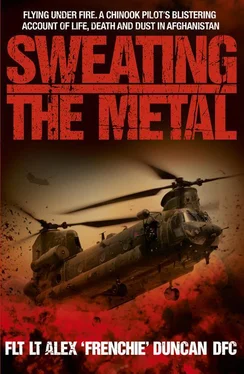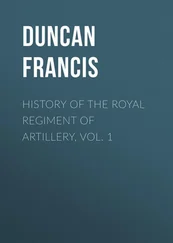The Taliban’s increased use of IEDs evidenced a sea change in tactics; no fighting force can suffer the rate of attrition that the Taliban did throughout 2006 and 2007 without feeling it. So they went the only way they could. IEDs require one man to manufacture, one or two men to plant. No maintenance required. No risk to their fighters. Forty-seven ISAF troops died as a result of IEDs in 2006; but in twelve months to December 2008, that figure had more than trebled to 152. Everything changes in a nanosecond; life really does turn on a sixpence.
It’s one of the vehicles that had been providing force protection for the convoy that has been blown up. The MERT is off and on again in quick order, bringing with them five casualties. One is beyond help, having died on the ground – Fijian Trooper Ratu Babakobau, twenty-nine, of the Household Cavalry. Princes William and Harry will both later pay tribute to him. Poor guy, he’d been in theatre less than a month and it was his first deployment overseas. He was married, and the father of two young boys aged four and one who will now have to grow up without him. It’s heartbreaking. Another of the casualties is in a bad way, with traumatic injuries to his legs and arms – it looks like he and Ratu took the brunt of the blast. Two others have burns of varying degrees – one is another soldier from the Household Cavalry, the other an Afghan national who had been working with the team as a translator. Finally, there is one T3, another soldier of the Household Cavalry who is walking wounded.
We race back to Bastion as quickly as we can and are on the ground at Nightingale by 14:20, so it’s a quick mission. Fortunately, the four casualties survived.
There’s to be no rest for us, however. Ten minutes after shutting down and arriving back at the IRT tent, I’m sat back in the same chair with my boots off, cooling down with an ice-cold Coke from the fridge and a nice cool Mars Bar. Chocolate is a rare commodity here for obvious reasons. There’s no chance for me to enjoy this one though. Just as I take my second bite, the phone rings again; we’ve got another shout. I throw the Mars Bar on the sofa and swallow the last of my Coke as I lace up my boots and run once again for the JOC. Here we go again.
This time, we’re being scrambled for a baby girl at FOB Gibraltar. She’s a T1, suffering from meningitis. This job could really get to you if you let it, and somehow it’s even harder when you’re dealing with kids. We land on at Gibraltar without incident and the baby girl is brought on almost as soon as the ramp comes down. She’s in a bad way. I’ve no idea who her parents are, but my heart goes out to them.
As soon as I’m away from Gibraltar, the MERT surgeon talks to me on the radio. ‘Guys, we have to take this one to Lashkar Gah,’ he says.
‘Negative.’ I tell him, we’re taking her to Bastion.
‘No,’ says the surgeon. ‘We have been told by our ops that Afghan civilians have to go to the Afghan hospital at Lashkar Gah. If she goes to Bastion she’s going to take a bed that might be needed for a British soldier.’
I can tell from the timbre of his voice that he’s unhappy about this. He’s speaking the words but there’s no heart behind what he’s saying. However, the standing orders are explicit: if we are picking up an Afghan civilian, they have to be taken to an Afghan hospital.
‘Okay,’ I say to the doctor. ‘Straight down the line; I want you to tell me honestly. Don’t colour your response with your own thoughts or feelings – has Lashkar Gah got the facilities to deal with a case of meningitis?’
‘I don’t think they do.’
I didn’t have to think for very long. ‘Right, then I’ve made my decision,’ I say. ‘My responsibility as aircraft captain is to ensure the safety of all the passengers on this aircraft and to make decisions to ensure they remain safe. Taking this girl to Lashkar Gah will not ensure her safety so we are flying straight to Bastion.’
When I called the tower at Bastion to advise them of our impending arrival, they tried to direct us to Lashkar Gah, but I was having none of it.
‘Bastion Tower, Lobster Three One, negative. We are en route to Bastion with one casualty.’
‘Lobster Three One, Tower, do you require Nightingale?’ At last. They got the message.
‘Tower, Lobster 31, affirmative.’
‘Roger, cleared to land, Nightingale.’
The ambulance is waiting as we land and there’s a quick handover from the MERT. The girl is whisked off to all the expertise and know-how that British medicine and clinical care can offer. At least this way she has a chance.
As soon as I’m back at the JOC, I tell JP exactly what I’ve done.
‘Don’t worry mate, that’s fine, I’ll sort it out,’ he says. That’s one of the things that make him such a great leader. Do the right thing and even if it goes against SOP, he’ll support you to the hilt. I don’t know what he did or said, or to whom, but I know it caused a stir.
The reasons for my actions were simple: there was no point in risking the aircraft and crew only to take a casualty to a place where she was not going to survive. We may as well have saved ourselves the bother and stayed at home. Taking her to Lash would’ve been tantamount to signing her death warrant and I wasn’t prepared to do that.
If the situation arose again I’d make the same decision.
Something unusual to break the monotony of day-to-day taskings is always welcome in Helmand Province but, perhaps surprisingly for a war zone, unusual happenings are in short supply. I guess it’s all a matter of perspective, but it’s amazing what you get used to. By now, with several Dets under our belts, most of us were well used to the daily litany of resupply runs, underslung loads, troop insertions and extractions, and yes – to a degree – even coming under fire.
There are some things that we really enjoy doing, and generally they are the things that we know are going to have the biggest impact on the guys at the front. For all that we as aircrew gripe about the conditions at KAF, and Bastion to a degree, we’re just sounding off – we know we have it good by comparison. It’s in the nature of the beast to complain; all military people do it, it’s in our DNA. But the guys at the FOBs and PBs, not only are they living in spartan, primitive conditions – in some cases without running water or proper toilets, living off basic rations – on top of all that, they get malleted by the Taliban when they’re inside, and attacked when they venture out on patrol. So anything we can do to improve morale is good from our perspective and we’ll go out of our way to do it.
The thing that takes up the most room in the cabs is mail and it’s the one thing we never turn down because we know how important it is. So much of it comes through – what with the letters, welfare shoeboxes and the guys going mental on Amazon and Play.com – we get it by the four-tonne load! The guys really appreciate the welfare boxes. We get quite a few that come to us at Bastion and KAF but we take them all to the troops at the FOBs and hand them out there because it lifts their morale so much. We’ve been known to literally stack the aircraft floor to ceiling. The guys are used to it now and prioritise handwritten mail and then squeeze in whatever else they can.

We flew a fair bit of mail on May 10th, which started out as a fairly routine day, but finished anything but. We were operating out of KAF on the task line with the call sign Daybreaker Two One, flying with Hannah who was in Daybreaker Two Zero. It had been a long day that saw us flying all over the province with supplies, post and other assorted items. Towards the end of the day, we were en route to FOB Inkerman and FOB Robinson. Hannah was leading the formation and I was her wingman.
Читать дальше













